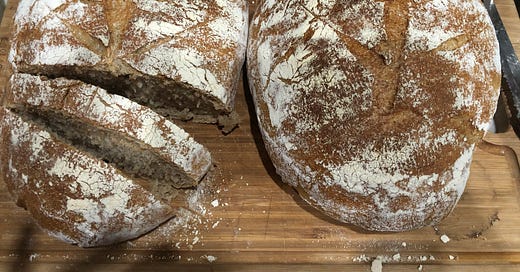Introducing the St. Isidore Foundation
Dedicated to the integration of academic and agrarian arts
Some of you know me personally and may already know about my plans for the St. Isidore Foundation, but some of you have found this Catholic Permaculture substack without knowing me directly, and for those of you in that latter category I want to take a brief moment to introduce the nonprofit foundation my wife and I have started with some friends that in many ways seeks to become an embodiment of and educational arm for Catholic permaculture. [NOTE: This nonprofit is not yet a 501c3 organization, but we plan to apply for 501c3 status as soon as potential donors would like us to have one. Knowing that donors can receive tax deductions for donations made to a nonprofit so long as the nonprofit has 501c3 status within a couple years of receiving such donations makes us not feel too rushed to file a bunch of paperwork just yet.]
Put most simply, the ultimate goal of the St. Isidore Foundation is to integrate the academic and agrarian arts in a Catholic plan of life via various collegiate farm programs: perhaps eventually a fully-fledged four-year undergraduate program, but until such a grand goal might become actualized perhaps a junior college program, an MA program in Classical Education (mostly online but with a family-friendly on-farm summer residency, a “study afield” program, a gap year program, a sabbatical program for Catholic scholars (or scholars studying Catholic things), etc.
The grandest of these goals would require a fair bit of land, facilities, and money, so until St. Isidore’s finds some generous donors (and/or I win the lottery, which is hard to do when I almost never buy tickets) we are going to offer a few webinars and at least one online enrichment course to see if we can use such virtual offerings to publicize our grand vision, get to know people interested in such things, etc.
An account of our current plans for webinars and an online enrichment course follows. [NOTE: I’d like to start making more posts to this substack again soon too, so hopefully before too long you’ll start seeing here more book reviews, accounts of my recent building projects, etc.]
You should be able to click on the underlined titles of the events to send us an RSVP for each event. You can also sign up for newsletters specific to St. Isidore’s so in the future we can avoid bothering people who aren’t interested in such events. If those interested in such things will indicate such by signing up for newsletters above and/or sending RSVPs for specific events below, we shouldn’t feel the need to make many other posts about St. Isidore’s via this Catholic Permaculture substack moving forward.
Introductory Webinar: Explanation and Justification for the St. Isidore Foundation
Tuesday, February 25th, 7-9pm eastern time
Join us for a discussion of why we want to found a collegiate farm program, the ultimate goals of the St. Isidore Foundation, and what programs we hope to offer in the meantime.
Inaugural Enrichment Course: Alchemy
Tuesdays, 7-9pm eastern time, March 18th through April 29th
Join Dr. Daniel Barr (PhD in chemistry) and Dr. Matthew Brumit (PhD in literature) as they discuss alchemy. Here’s Dr. Barr’s description of the course: Were you aware that the resurrection of Jesus anchored belief in the philosopher’s stone? Would you believe that modern chemists have reproduced a surprising number of medieval alchemist’s experiments? Have you thought about how living your life with intentionality impacts the outcomes you experience? Did you know that there are still practicing alchemists today? Come explore all these questions and more in our seminar-style course on alchemy experienced in science and literature, and be prepared to leave with a new approach to your daily life and a deeper sense of your place within the world at large.
Webinar: Baking (bread, scones, sourdough, etc.)
Thursday, March 6th, 7-9pm
Join us as we discuss bread and all things baking: why we like baking our own bread, simple recipes, etc. We started buying simple bread (made with only the necessary ingredients) back in Texas. Around the same time, a friend brought a homemade yeast bread to our house for a communal meal, and we followed her recipe for years (and still use it on occasion). By the time we were in North Dakota, Matt started making scones, and Amanda got into royal icing cookies (both of which we sold at the local farmer’s market). Since then, we’ve branched out into sourdough a bit (though we’re far from experts on that front). We’ll answer questions about baking to the best of our abilities, see what others have to say about their own experiences with baking, and share a few of our favorite recipes (including one for a “fasting bread” that’s great for Lent).
Webinar: Celebrating (the Vigil of) the Feast of Our Patron St. Isidore of Seville
Thursday, April 3rd, 7-9pm eastern time
Join us for a celebration of the feast day of our patron St. Isidore of Seville, who wrote a fascinating book called the Etymologies in an effort to provide the Christian faithful (especially priests) with a single-volume introduction to just about everything (beginning with the liberal arts and progressing to everything from rocks to angels).
Webinar: Celebrating the Feast of Our Patron St. Isidore the Farmer
Thursday, May 15th, 7-9pm eastern time
Join us for a celebration of the feast day of our patron St. Isidore the Farmer (aka St. Isidore the Laborer), known for his life of work and prayer and for various miracles, such as having angels help him cultivate the fields.



